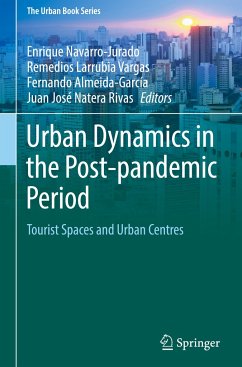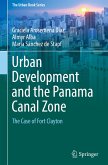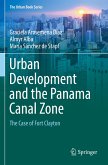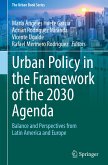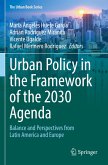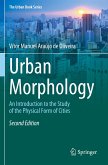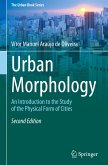Urban Dynamics in the Post-pandemic Period
Tourist Spaces and Urban Centres
Herausgegeben:Navarro-Jurado, Enrique; Larrubia Vargas, Remedios; Almeida-García, Fernando; Natera Rivas, Juan José
Urban Dynamics in the Post-pandemic Period
Tourist Spaces and Urban Centres
Herausgegeben:Navarro-Jurado, Enrique; Larrubia Vargas, Remedios; Almeida-García, Fernando; Natera Rivas, Juan José
- Gebundenes Buch
- Merkliste
- Auf die Merkliste
- Bewerten Bewerten
- Teilen
- Produkt teilen
- Produkterinnerung
- Produkterinnerung
This book offers a unique perspective on urban processes affecting tourist spaces and city centres. Economic, social and environmental uncertainty has been commonplace since March 2019, when mobility slowed down across the globe. The COVID-19 pandemic accelerated trends that have been investigated in urban space for years. The incorporation of technologies, the expansion of tourism and the introduction of policies that in part want to advance sustainability are generating processes of reorganisation of territories that are driving changes. These changes will affect models of city, urbanism and…mehr
Andere Kunden interessierten sich auch für
![Urban Dynamics in the Post-pandemic Period Urban Dynamics in the Post-pandemic Period]() Urban Dynamics in the Post-pandemic Period100,99 €
Urban Dynamics in the Post-pandemic Period100,99 €![Urban Development and the Panama Canal Zone Urban Development and the Panama Canal Zone]() Graciela Arosemena DíazUrban Development and the Panama Canal Zone77,99 €
Graciela Arosemena DíazUrban Development and the Panama Canal Zone77,99 €![Urban Development and the Panama Canal Zone Urban Development and the Panama Canal Zone]() Graciela Arosemena DíazUrban Development and the Panama Canal Zone75,99 €
Graciela Arosemena DíazUrban Development and the Panama Canal Zone75,99 €![Urban Policy in the Framework of the 2030 Agenda Urban Policy in the Framework of the 2030 Agenda]() Urban Policy in the Framework of the 2030 Agenda100,99 €
Urban Policy in the Framework of the 2030 Agenda100,99 €![Urban Policy in the Framework of the 2030 Agenda Urban Policy in the Framework of the 2030 Agenda]() Urban Policy in the Framework of the 2030 Agenda100,99 €
Urban Policy in the Framework of the 2030 Agenda100,99 €![Urban Morphology Urban Morphology]() Vítor Manuel Araújo de OliveiraUrban Morphology45,99 €
Vítor Manuel Araújo de OliveiraUrban Morphology45,99 €![Urban Morphology Urban Morphology]() Vítor Manuel Araújo de OliveiraUrban Morphology64,99 €
Vítor Manuel Araújo de OliveiraUrban Morphology64,99 €-
-
-
This book offers a unique perspective on urban processes affecting tourist spaces and city centres. Economic, social and environmental uncertainty has been commonplace since March 2019, when mobility slowed down across the globe. The COVID-19 pandemic accelerated trends that have been investigated in urban space for years. The incorporation of technologies, the expansion of tourism and the introduction of policies that in part want to advance sustainability are generating processes of reorganisation of territories that are driving changes. These changes will affect models of city, urbanism and society.
This publication is directed to a wide spectrum of people interested in urban processes, tourism and social change in the context of the Post-Pandemic Covid-19. In particular, the book is aimed at researchers, undergraduate and postgraduate students, consultants, public administrations and the public interested in the recent challenges that are affecting developed and developing societies.
This publication is directed to a wide spectrum of people interested in urban processes, tourism and social change in the context of the Post-Pandemic Covid-19. In particular, the book is aimed at researchers, undergraduate and postgraduate students, consultants, public administrations and the public interested in the recent challenges that are affecting developed and developing societies.
Produktdetails
- Produktdetails
- The Urban Book Series
- Verlag: Springer / Springer International Publishing / Springer, Berlin
- Artikelnr. des Verlages: 978-3-031-36016-9
- 2023
- Seitenzahl: 384
- Erscheinungstermin: 12. August 2023
- Englisch
- Abmessung: 241mm x 160mm x 25mm
- Gewicht: 810g
- ISBN-13: 9783031360169
- ISBN-10: 3031360168
- Artikelnr.: 68074012
- Herstellerkennzeichnung
- Springer-Verlag GmbH
- Tiergartenstr. 17
- 69121 Heidelberg
- ProductSafety@springernature.com
- The Urban Book Series
- Verlag: Springer / Springer International Publishing / Springer, Berlin
- Artikelnr. des Verlages: 978-3-031-36016-9
- 2023
- Seitenzahl: 384
- Erscheinungstermin: 12. August 2023
- Englisch
- Abmessung: 241mm x 160mm x 25mm
- Gewicht: 810g
- ISBN-13: 9783031360169
- ISBN-10: 3031360168
- Artikelnr.: 68074012
- Herstellerkennzeichnung
- Springer-Verlag GmbH
- Tiergartenstr. 17
- 69121 Heidelberg
- ProductSafety@springernature.com
Part 1: Tourism dynamics in urban city centres.- Towards resilient urbanism in tourist cities: post-pandemic challenges.- The pain of being a resident in Granada. Analysis of the accommodation offer and residents´ perception.- Recent socio-spatial transformations in the San Pedro neighbourhood (Santiago de Compostela).- The touristification of historic centres through commercial gentrification in times of Covid-19.- Citizen resistance in touristified neighborhoods. A post-pandemic análisis.- Neoliberalism, collaborative economy, and short-term rentals regulation in Andalusia, Spain.- Changes in the role of heritage in historic centres: the mutation of historic buildings into tourist accommodation.- Part 2: Urban-tourist spaces on the coast: New urbanised spaces and resistance.- Urban-tourism spaces on the coast: transformations, challenges and globalisation in uncertain scenarios.- Landscape preservation on the Mediterranean coast; do social movements play a decisive role? The case ofthe Costa Brava (Spain).- The construction of sustainable territorial models in the aftermath of the Covid-19 pandemic: Lessons from medium-sized Mediterranean cities.- Housing change during the Covid-19 pandemic in the metropolitan areas of the Canary Island capitals (Spain).- Two megaprojects - One city. Learning between large-scale urban development projects on Tenerife, Spain.- Touristification process in seaside destination inland: The case of Mallorca Island, Spain.- Part 3: Urban transformations: New dynamics, conflicts and challenges in a context of uncertainty.- Towards urban degrowth? Urban planning as a common thread of contradictory dynamics in cities.- Shrinking cities in Spain: Shrinking medium-sized cities in the 21st century. Depopulation and employment.- The peripheries of Spanish developmentalism. an enduring model of urban fragmentation.- Housing, a problem perpetuated over time in Spain. New initiatives to promote access to affordable housing in Madrid.- Residentialexpectations in a neoliberal perspective: A sociological view of social classes and the right to housing.- (Re)thinking gentrification processes. The place of religion.- Metropolitan spatial reconfiguration and the mobility transition: Sustainability challenges in the fragmented city.- Sustainability and urban development strategies: Ciudad Real.- Part 4: Postscript.- Intra-urban borders in border cities: The nationally interchangeable dynamics of urban centrality.
Part 1: Tourism dynamics in urban city centres.- Towards resilient urbanism in tourist cities: post-pandemic challenges.- The pain of being a resident in Granada. Analysis of the accommodation offer and residents´ perception.- Recent socio-spatial transformations in the San Pedro neighbourhood (Santiago de Compostela).- The touristification of historic centres through commercial gentrification in times of Covid-19.- Citizen resistance in touristified neighborhoods. A post-pandemic análisis.- Neoliberalism, collaborative economy, and short-term rentals regulation in Andalusia, Spain.- Changes in the role of heritage in historic centres: the mutation of historic buildings into tourist accommodation.- Part 2: Urban-tourist spaces on the coast: New urbanised spaces and resistance.- Urban-tourism spaces on the coast: transformations, challenges and globalisation in uncertain scenarios.- Landscape preservation on the Mediterranean coast; do social movements play a decisive role? The case ofthe Costa Brava (Spain).- The construction of sustainable territorial models in the aftermath of the Covid-19 pandemic: Lessons from medium-sized Mediterranean cities.- Housing change during the Covid-19 pandemic in the metropolitan areas of the Canary Island capitals (Spain).- Two megaprojects – One city. Learning between large-scale urban development projects on Tenerife, Spain.- Touristification process in seaside destination inland: The case of Mallorca Island, Spain.- Part 3: Urban transformations: New dynamics, conflicts and challenges in a context of uncertainty.- Towards urban degrowth? Urban planning as a common thread of contradictory dynamics in cities.- Shrinking cities in Spain: Shrinking medium-sized cities in the 21st century. Depopulation and employment.- The peripheries of Spanish developmentalism. an enduring model of urban fragmentation.- Housing, a problem perpetuated over time in Spain. New initiatives to promote access to affordable housing in Madrid.- Residentialexpectations in a neoliberal perspective: A sociological view of social classes and the right to housing.- (Re)thinking gentrification processes. The place of religion.- Metropolitan spatial reconfiguration and the mobility transition: Sustainability challenges in the fragmented city.- Sustainability and urban development strategies: Ciudad Real.- Part 4: Postscript.- Intra-urban borders in border cities: The nationally interchangeable dynamics of urban centrality.
Part 1: Tourism dynamics in urban city centres.- Towards resilient urbanism in tourist cities: post-pandemic challenges.- The pain of being a resident in Granada. Analysis of the accommodation offer and residents´ perception.- Recent socio-spatial transformations in the San Pedro neighbourhood (Santiago de Compostela).- The touristification of historic centres through commercial gentrification in times of Covid-19.- Citizen resistance in touristified neighborhoods. A post-pandemic análisis.- Neoliberalism, collaborative economy, and short-term rentals regulation in Andalusia, Spain.- Changes in the role of heritage in historic centres: the mutation of historic buildings into tourist accommodation.- Part 2: Urban-tourist spaces on the coast: New urbanised spaces and resistance.- Urban-tourism spaces on the coast: transformations, challenges and globalisation in uncertain scenarios.- Landscape preservation on the Mediterranean coast; do social movements play a decisive role? The case ofthe Costa Brava (Spain).- The construction of sustainable territorial models in the aftermath of the Covid-19 pandemic: Lessons from medium-sized Mediterranean cities.- Housing change during the Covid-19 pandemic in the metropolitan areas of the Canary Island capitals (Spain).- Two megaprojects - One city. Learning between large-scale urban development projects on Tenerife, Spain.- Touristification process in seaside destination inland: The case of Mallorca Island, Spain.- Part 3: Urban transformations: New dynamics, conflicts and challenges in a context of uncertainty.- Towards urban degrowth? Urban planning as a common thread of contradictory dynamics in cities.- Shrinking cities in Spain: Shrinking medium-sized cities in the 21st century. Depopulation and employment.- The peripheries of Spanish developmentalism. an enduring model of urban fragmentation.- Housing, a problem perpetuated over time in Spain. New initiatives to promote access to affordable housing in Madrid.- Residentialexpectations in a neoliberal perspective: A sociological view of social classes and the right to housing.- (Re)thinking gentrification processes. The place of religion.- Metropolitan spatial reconfiguration and the mobility transition: Sustainability challenges in the fragmented city.- Sustainability and urban development strategies: Ciudad Real.- Part 4: Postscript.- Intra-urban borders in border cities: The nationally interchangeable dynamics of urban centrality.
Part 1: Tourism dynamics in urban city centres.- Towards resilient urbanism in tourist cities: post-pandemic challenges.- The pain of being a resident in Granada. Analysis of the accommodation offer and residents´ perception.- Recent socio-spatial transformations in the San Pedro neighbourhood (Santiago de Compostela).- The touristification of historic centres through commercial gentrification in times of Covid-19.- Citizen resistance in touristified neighborhoods. A post-pandemic análisis.- Neoliberalism, collaborative economy, and short-term rentals regulation in Andalusia, Spain.- Changes in the role of heritage in historic centres: the mutation of historic buildings into tourist accommodation.- Part 2: Urban-tourist spaces on the coast: New urbanised spaces and resistance.- Urban-tourism spaces on the coast: transformations, challenges and globalisation in uncertain scenarios.- Landscape preservation on the Mediterranean coast; do social movements play a decisive role? The case ofthe Costa Brava (Spain).- The construction of sustainable territorial models in the aftermath of the Covid-19 pandemic: Lessons from medium-sized Mediterranean cities.- Housing change during the Covid-19 pandemic in the metropolitan areas of the Canary Island capitals (Spain).- Two megaprojects – One city. Learning between large-scale urban development projects on Tenerife, Spain.- Touristification process in seaside destination inland: The case of Mallorca Island, Spain.- Part 3: Urban transformations: New dynamics, conflicts and challenges in a context of uncertainty.- Towards urban degrowth? Urban planning as a common thread of contradictory dynamics in cities.- Shrinking cities in Spain: Shrinking medium-sized cities in the 21st century. Depopulation and employment.- The peripheries of Spanish developmentalism. an enduring model of urban fragmentation.- Housing, a problem perpetuated over time in Spain. New initiatives to promote access to affordable housing in Madrid.- Residentialexpectations in a neoliberal perspective: A sociological view of social classes and the right to housing.- (Re)thinking gentrification processes. The place of religion.- Metropolitan spatial reconfiguration and the mobility transition: Sustainability challenges in the fragmented city.- Sustainability and urban development strategies: Ciudad Real.- Part 4: Postscript.- Intra-urban borders in border cities: The nationally interchangeable dynamics of urban centrality.

